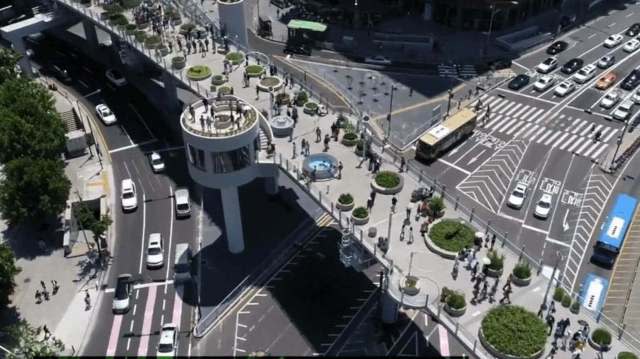‘Amazing’ footage of this city’s highway transformation has people envious: ‘Every city needs one of these’
Keeping the planet from warming more than 2.7 degrees will require plenty of innovation.
Perhaps turning highways into gardens is just the step humanity needs to take.
Concrete is worse for the climate than flying, so Seoullo 7017 is the perfect project.
The six-year-old sky garden could provide a template for other cities to reimagine certain spaces into good-for-the-environment expanses.

The public walkway was once part of a highway and had been closed to traffic since 2006. It is now a one-kilometer (0.6-mile) greenway with 24,000 trees, shrubs, and flowers that is open 24 hours per day.
“Every city needs one of these,” one Redditor said.
Others noted many cities have one, including New York, Chicago, and Houston. Detroit, Philadelphia, and Boston are in on the trend too.
“This looks amazing,” another commenter wrote of the footage. “I live in Toronto and would love to see something like this… unfortunately, we have to get our public transportation in order first before we can even consider closing down a highway. How does one of the largest cities in Canada survive on 2.5 subway lines still boggles my mind.”
Inside Climate News reported in 2022 that cement manufacturers doubled their carbon dioxide pollution over the last 20 years. The industry will need to cut back its pollution by no less than 16% by 2030 to align with the Paris Agreement.
It accounts for at least 8% of global carbon dioxide pollution, whereas airlines are the cause of 2.8%.
There may be a few solutions to ease this problem, including underground roads and green cement technology, that reduces the pollution of production by 70% and produces a faster curing, sturdier, cheaper, and more energy-efficient cement.
But the best way to reduce the impact of “the most destructive material on Earth” is divestment. The interstate highway boom mostly dissected communities of color and reinforced racism, and the $1 billion Reconnecting Communities Pilot Program is a drop in the bucket.
“If a highway has to be empty before you repurpose it in a creative way like this (or demolish it), then it’ll never happen,” one Redditor wrote. “Amount of traffic is not a factor in these decisions. Traffic always finds a way. It won’t cause city wide gridlock or anything. Transportation is a human (economic) force, not a physical force like water in a pipe.”
Another said: “NY has done this (the Highline) and the city is 10x bigger and has 10x worse traffic. It can be done if a city wants it ….”
Join our free newsletter for weekly updates on the coolest innovations improving our lives and saving our planet.

 Yahoo Finance
Yahoo Finance 